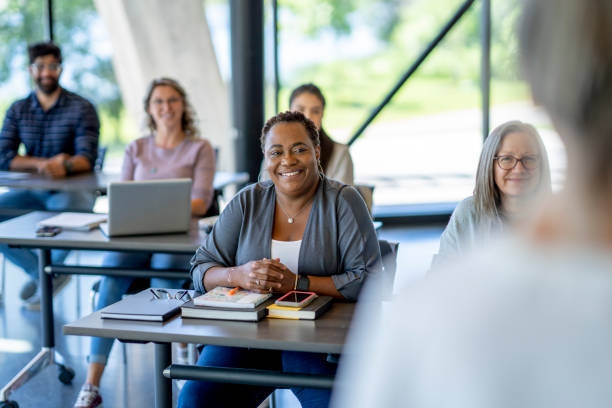
Age Inclusivity in Higher Education


Aging populations mean more older adults are looking to higher education to meet their professional needs as they experience longer work lives. Similarly, many older adults plan to stay engaged in some form of learning for personal development—with institutions of higher education being an appealing educational destination. In addition to increased diversity in the age of learners, there is also increased age diversity among faculty, staff, alumni, and other communities of interest engaged with institutions of higher education.
An “age-inclusive” approach embraces the concept of ensuring higher education provides meaningful experiences across the entire life-course for all. For example, in addition to offering programs for age-diverse learners, an age-inclusive campus’s services and resources will provide healthcare services that meet the needs of individuals of all ages and acknowledge and address challenges that family caregivers face. Similarly, their personnel policies and practices uphold age inclusivity as part of their larger diversity, equity, and inclusion programs.
Ageist beliefs permeate society, with the neglect of age in academia and its historic age-segregated structure sustaining negative attitudes and unconscious age biases that impact individuals of all ages. There are many ways higher education can shape teaching and learning environments that disrupt ageist beliefs and biases in constructive ways and promote intergenerational solidarity.
The Age Inclusivity in Higher Education (AIHE) program is an outgrowth of the Society’s support, beginning in 2014, of the Age-Friendly University initiative initiated by Dublin City University and now led by Arizona State University. GSA’s Academy of Gerontology in Higher Education (AGHE), an organization of colleges and universities that offer education, training, and research programs in the field of aging, formed an AIHE workgroup. The GSA AIHE Workgroup publishes a quarterly newsletter, Age Inclusivity in Higher Education; has developed a toolkit; and produces additional resources that support age-inclusive programs, practices, and partnerships in higher education. The AIHE Workgroup welcomes feedback about the resources, including how those in academia use them to promote age inclusivity at their institution. Please send correspondence to ageinclusive@geron.org.
Age Inclusivity in Higher Education Quick Start Guide
This quick start guide provides ideas for communication about age and aging across all the domains of higher education, including Teaching & Learning, Services & Resources, Student Affairs, Physical Environment, Research, Personnel, and Outreach & Engagement. For each domain described in the Age Inclusivity Domains in Higher Education model, we present strategies from the National Center to Reframe Aging to promote inclusion of students, faculty, and staff of all ages on college campuses.
Click here to view a scrollable version of this publication.
Age-Friendly Inventory and Campus Climate Survey (ICCS)
Any initiative to advance age inclusivity on a campus warrants examination with an empirical lens to identify assets, gaps, and opportunities. Using a systems-level, campus-wide approach, the Age-Friendly Inventory and Campus Climate Survey (ICCS) provides a means by which campuses can evaluate both the nature of age-friendly practices and the perceptions of these practices by students, faculty, and staff.
AIDHE Evidence-Based Strategies for Creating Age-Inclusive Campuses
The AIDHE model advocates that age-inclusive campus practices be considered within seven core institutional domains that impact age-diverse students, faculty, and staff: Teaching and Learning, Student Affairs, Outreach and Engagement, Research, Personnel, Services and Resources, and Physical Environment. This infographic is available to download and be used to open conversations about age inclusivity on your campuses.
Enhancing Age Inclusivity on Campus
Campuses ready to increase their age-inclusive practices and policies might begin by considering strategy recommendations developed from multi-phased research supported by the RRF Foundation on Aging. These strategies are in the core domains of Teaching and Learning, Personnel, and Student Affairs as reflected in the AIDHE model. The strategies shared are considered to have the highest potential for being both transformative and actionable. Infographics are available to download that can be used to open conversations about this topic on your campuses.
Tools for Age Inclusivity in Higher Education
Advancing age inclusivity can occur at different levels and junctures within an institution — for example, in a course or academic program, within a specific college, or across an entire campus. The toolkit can be used by faculty, students, administrators, and other campus leaders. The Gerontological Society of America (GSA) and its Academy for Gerontology in Higher Education (AGHE) designed this toolkit, with support from AARP, to provide resources to advance age inclusivity in institutions of higher education. The suite of tools can be used by faculty, students, administrators, and other campus leaders and may be adapted to meet your institution’s approach to making the case, building relationships, addressing ageism, crafting new efforts, and conducting assessments.
Click here to view a scrollable version of this publication.
Age Inclusivity in Higher Education Webinars
In these webinars, members of the GSA Age Inclusivity in Higher Education workgroup and others share their expertise and passion around age-inclusive programs, practices, and partnerships in higher education.
Age Inclusivity in Higher Education Newsletter
The Age Inclusivity in Higher Education Newsletter is a place where educators, administrators, scholars, and community members can share news about how colleges and universities are responding to aging populations and the rise of more age-diverse campuses.
AIHE Interest Group
AIHE Interest Group provides an opportunity for educators, researchers, administrators, and others interested in advancing age inclusivity in higher education, and members of the global Age-Friendly University (AFU) network, to share information about campus activities, network happenings, and related efforts that support the development of age-inclusive programs, practices, and partnerships.
Higher Education and Aging: The Age-Friendly Movement - Building a Case for Age Inclusivity
This What’s Hot publication addresses shifts in demographics that are leading to changes in higher education enrollment and illustrates how principles of the Age-Friendly University movement can be adopted to successfully address those changes. From welcoming older learners to ensuring graduates are prepared to work with and care for older persons, this edition of What’s Hot provides perspective on applying the broader age-friendly movement to higher education. The publication covers shifting perspectives about aging populations, the needs of a multigenerational workforce, the Age-Friendly University Movement, and examples of how several institutions of higher learning have embraced age inclusivity. It also provides resources for those wishing to learn more about age inclusivity in higher education.
| Access Date | Quiz Result | Score | Actions |
|---|